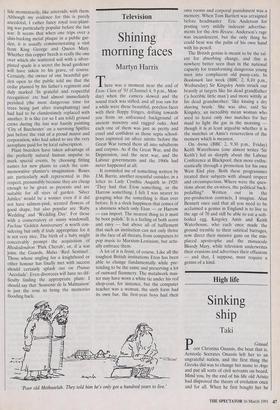Television
Shining
morning faces
Martyn Harris
There was a moment near the end of Eton: Class of '91 (Channel 4, 9 p.m., Mon- day) when the camera slowed and the sound track was stilled, and all you saw for a while were these beautiful, poreless faces with their floppy fringes, drifting towards you from an unfocused background of ancient masonry and rugged oaks. And each one of them was just as pretty and cruel and confident as those sepia school- boys captured on silver nitrite before the Great War turned them all into subalterns and corpses. As if the Great War, and the Depression, and the next war, and the Labour governments and the 1960s had never happened at all.
It reminded me of something written by J.M. Barrie, another resentful outsider, in a letter to Lady Cynthia Asquith in 1920: 'They had that Eton something, or the Harrow something. I felt I was nearer to grasping what the something is than ever before. It is a sleek happiness that comes of a shininess which only Eton — or Harrow — can import. The nearest thing to it must be boot polish.' It is a feeling of both scorn and envy — but above all of bafflement that such an institution can not only thrive in the face of all threats, from computers to pop music to Marxism-Leninism, but actu- ally embrace them.
A lot of it is front, of course. Like all the toughest British institutions Eton has been able to change fundamentally while pre- tending to be the same and preserving a lot of outward flummery. The metalwork mas- ter may have worn a white tie under his red shop-coat, for instance, but the computer teacher was a woman, the sixth form had its own bar, the first-year boys had their
own rooms and corporal punishment was a memory. When Tom Bartlett was arraigned before headmaster Eric Anderson for posting very mildly indecent advertise- ments for the Arts Review, Anderson's rage was incandescent. but the only thing he could beat was the palm of his own hand with his pencil.
The British genius is meant to be the tal- ent for absorbing change, and this is nowhere better seen than in the national capacity for transforming dangerous young men into complacent old pussy-cats. In Bookmark last week (BBC 2, 8.10 p.m., Wednesday) Sir Kingsley Amis struck out bravely at targets like his dead grandfather Ca horrible little man') and more wittily at his dead grandmother: 'like kissing a dry shaving brush.' She was also, said Sir Kingsley, an incredibly mean woman who used to leave only two matches for her maid to light the gas in the morning — though it is at least arguable whether it is the matches or Amiss resurrection of the memory which is meanest.
On Arena (BBC 2, 9.30 p.m., Friday) Keith Waterhouse (one almost writes 'Sir Keith') led us sleepily about the Labour Conference at Blackpool, then more enthu- siastically through a promotion for his own West End play. Both these programmes treated their subjects with absurd respect and circumspection. Where were the ques- tions about the ex-wives, the political back-
pedalling? Written out in the pre-production contracts, I imagine. Alan Bennett once said that all you need to be acclaimed a genius in England is to live to the age of 70 and still be able to eat a soft- boiled egg. Kingsley Amis and Keith Waterhouse, who each once made the ground tremble to their satirical barrages, now direct their massive guns on the mis- placed apostrophe and the minuscule Bloody Mary, while television underwrites their evasions and advertises their effusions — and that, I suppose, must require a genius of a kind.


























































 Previous page
Previous page